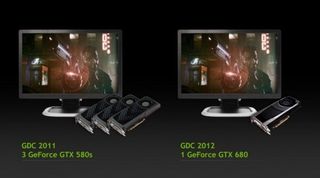Nvidia unveils the GeForce GTX 680: massively multicore, insanely powerful

You've known it was coming, but you are not prepared. Until now you've known it only as "Kepler," but after today you'll know it as the GeForce GTX 680—the fastest and most efficient GPU that Nvidia has ever built, and one of the sexiest we've ever laid eyes upon. (There's also the matter of their new 600m series of mobile GPUs that are capable of running games like Battlefield 3 smoothly off an slim, 9lb laptop with eight hours of battery life, but that's a whole other story to come shortly.)
So let's get right down to it.
First things first, here's the specs on the GeForce GTX 680. I hope you've got an extra set of pants available.

Yes, that's 1536 CUDA (Compute Unified Device Architecture) cores, up from 512 on the GTX 580. I believe that is what we can officially deem, "massively multicore." With Nvidia's new Kepler architecture, each processor contains up to 192 CUDA Cores, six times the number of cores as Nvidia's previous "Fermi" architecture. What does that mean? You get twice the performance per watt. As you can see above, the 680 also achieves memory speeds up to 6 Gbps, which according to Nvidia, is officially the highest speed of any GPU in history. You'd think they'd be making a bigger deal about that.

Nvidia also claims it's the world's fastest GPU, one that trumps the AMD Radeon HD7970 in terms of performance, perf per watt and especially in DX11 tessellation where Nvidia claims to be 4x better than AMD.

However, while the specs and stats are indeed impressive, just how powerful is it in real world terms? I'll give you an example. At GDC 2011, Epic Games unveiled their now famous "Samaritan" tech demo. At the time it was running on three GTX 580 GPUs. At GDC 2012, they ran the exact same demo on just ONE GTX 680, and I saw it with my own eyes.

Moreover, thanks to high efficiency heat piping, improved airflow and sound dampening materials used in the GPU fan, it's also the coolest and quietest high end GPU Nvidia has ever produced. Nvidia claims that not only is it quieter, but the sound that the card does make is more "pleasing" to the ears. I'm not sure how they came to that conclusion, but I'll allow it. We've heard it in action (or struggled to) and felt the heat (or lack thereof) ourselves. They're not lying. There's no mad science behind how they've made this thing so cool and quiet, it's simply better engineering. Impressive is an understatement.
The biggest gaming news, reviews and hardware deals
Keep up to date with the most important stories and the best deals, as picked by the PC Gamer team.
Most Popular

